The National Certificate of Educational Achievement (NCEA) is New Zealand’s flexible, standards-based qualification system that supports diverse learning needs, subject choices, and pathways to university and careers.
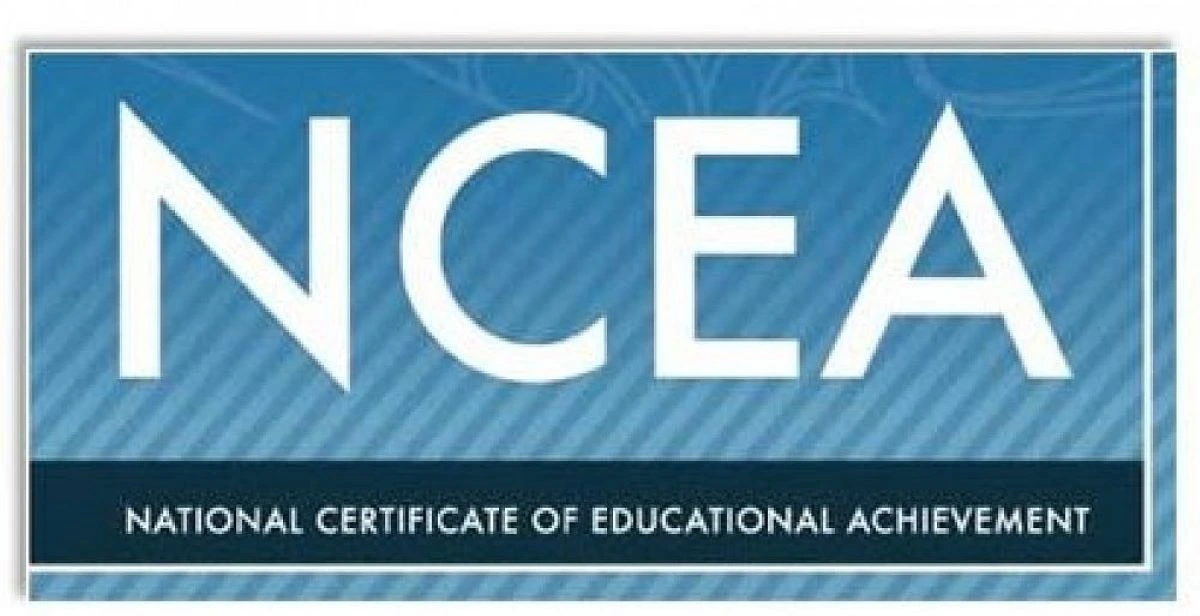
What is NCEA?
NCEA (National Certificate of Educational Achievement) is New Zealand’s official secondary school qualification. It replaced older qualifications like School Certificate and Bursary in the early 2000s, offering a more inclusive, flexible framework. Students earn credits through achievement standards in each subject, which can be academic, practical, or vocational. The system supports personalized learning paths and prepares students for both higher education and skilled employment.
NCEA can seem complicated at first, but it follows a logical progression from Year 11 to Year 13. Here is the basic structure you need to know:
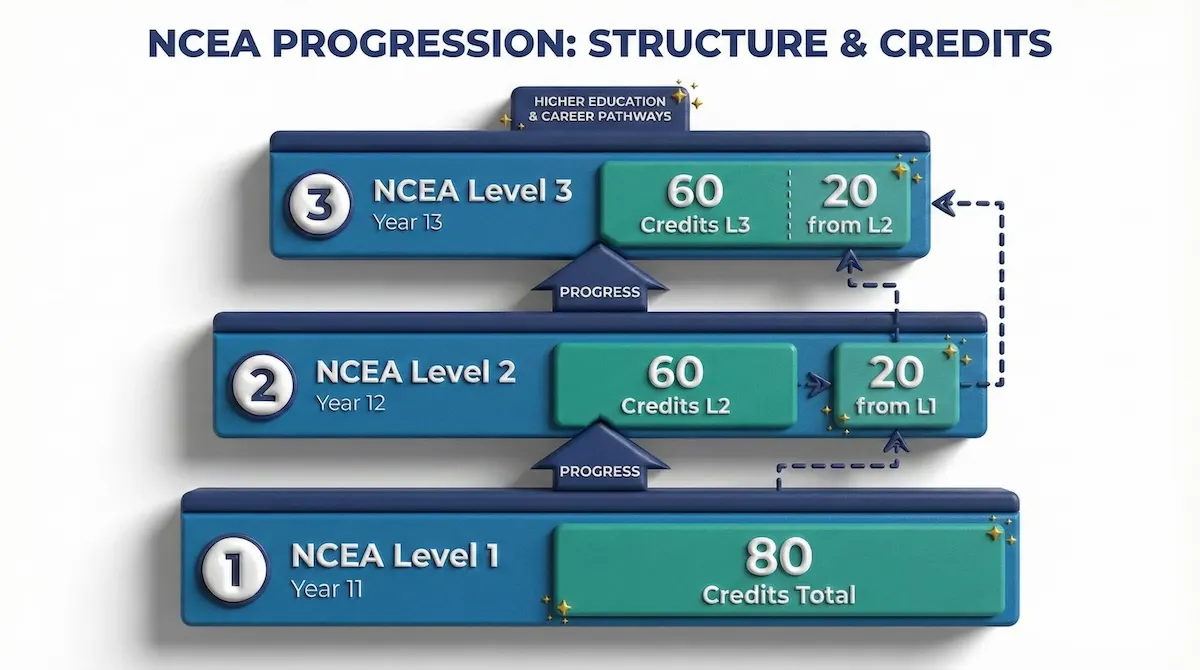
Understanding the three levels of NCEA ensures you know exactly how many credits you need each year.
As you can see, passing each level unlocks the next, building your qualification step by step.
How NCEA Works
NCEA has three levels—Level 1 (Year 11), Level 2 (Year 12), and Level 3 (Year 13). To pass each level, students typically need 80 credits. These credits come from internal and external assessments across various subjects.
Each subject is broken down into standards, with each standard carrying a set number of credits. Results are graded as Not Achieved, Achieved, Merit, or Excellence. Students can earn endorsements at the subject or certificate level by achieving high grades across multiple standards.
Wide Range of Subjects in NCEA
One of NCEA’s strengths is its wide subject range that caters to diverse interests and career goals. Students can choose from traditional academic subjects to practical and vocational areas, including:
- NCEA Accounting, NCEA Business Studies, NCEA Commerce
- NCEA Biology, NCEA Chemistry, NCEA Physics, NCEA Earth and Space Science, NCEA Science
- NCEA Classical Studies, NCEA History, NCEA Geography, NCEA Social Studies, NCEA Religious Studies, NCEA Psychology, NCEA Sociology
- NCEA Mathematics and Statistics, NCEA Numeracy
- NCEA English, NCEA English Language, NCEA English for Academic Purposes, NCEA Literacy – Reading, NCEA Literacy – Writing
- NCEA Digital Technologies, NCEA Technology, NCEA Materials and Processing Technology
- NCEA Art History, NCEA Visual Arts, NCEA Design and Visual Communication
- NCEA Drama, NCEA Music, NCEA Dance, NCEA Media Studies
- NCEA Health, NCEA Health Studies, NCEA Physical Education, NCEA Home Economics
- NCEA Economics, NCEA Legal Studies, NCEA Agribusiness, NCEA Agricultural and Horticultural Science
- NCEA Education for Sustainability, NCEA Core Skills, NCEA Early Childhood Education, NCEA Supported Learning, NCEA Adult Education
- NCEA Māori, NCEA Pacific Studies
- NCEA Driver License (Class 1)
This variety allows students to create a balanced and interest-driven curriculum. It also supports cross-disciplinary skills—essential for future academic or workplace success.
Internal and External Assessment
Assessment in NCEA is split between internal tasks (done during the school year) and external exams (held at the end of the year). Internal assessments include essays, presentations, experiments, and practical work that are ideal for subjects like NCEA Visual Arts or NCEA Home Economics. External exams are more common in core academic areas such as NCEA Mathematics and Statistics or NCEA History.
Assessments generally fall into two categories, and understanding the difference is crucial for your study schedule.
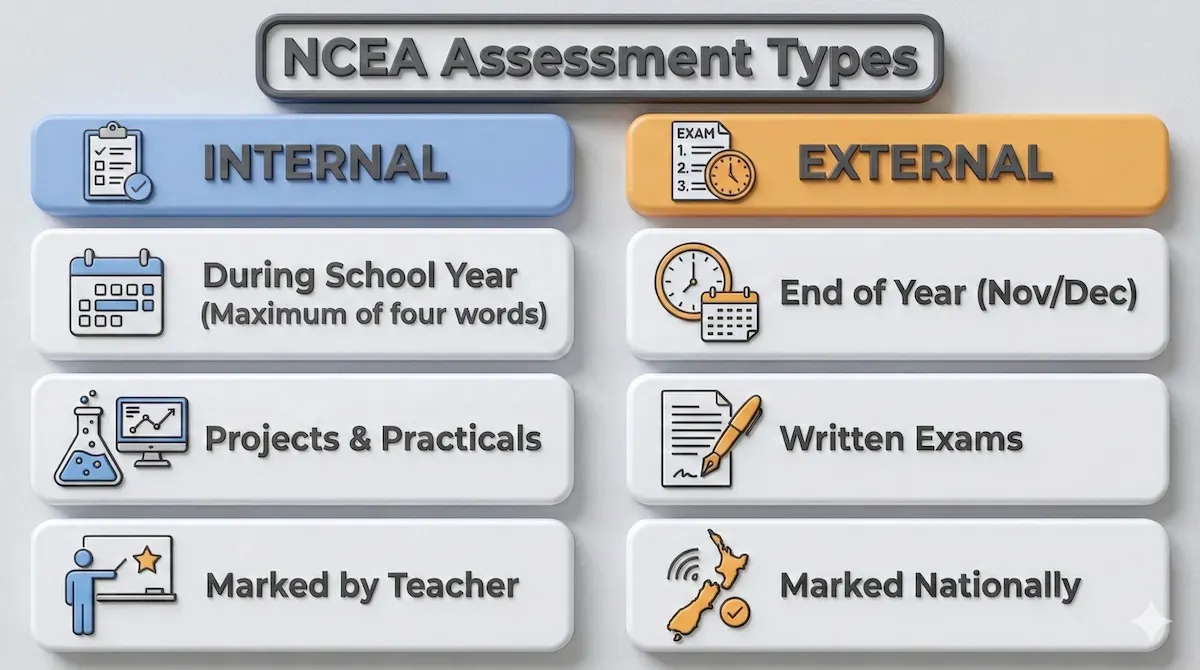
Balancing internal assignments and external exams is key to a successful NCEA year.
Most students have a mix of both, meaning you need to balance consistent work during the year with end-of-year exam prep.
Why Students Seek NCEA Tutoring
With such a vast subject list and assessment pressure, it’s no surprise that many students turn to NCEA tutoring. Whether it’s NCEA Accounting, NCEA Chemistry and Biology (Level 1), or NCEA English for Academic Purposes, students often benefit from expert support to break down complex topics, practice exam techniques, and manage internal assessments.
Not sure if you need professional help? Follow this simple decision tree to evaluate your current situation.
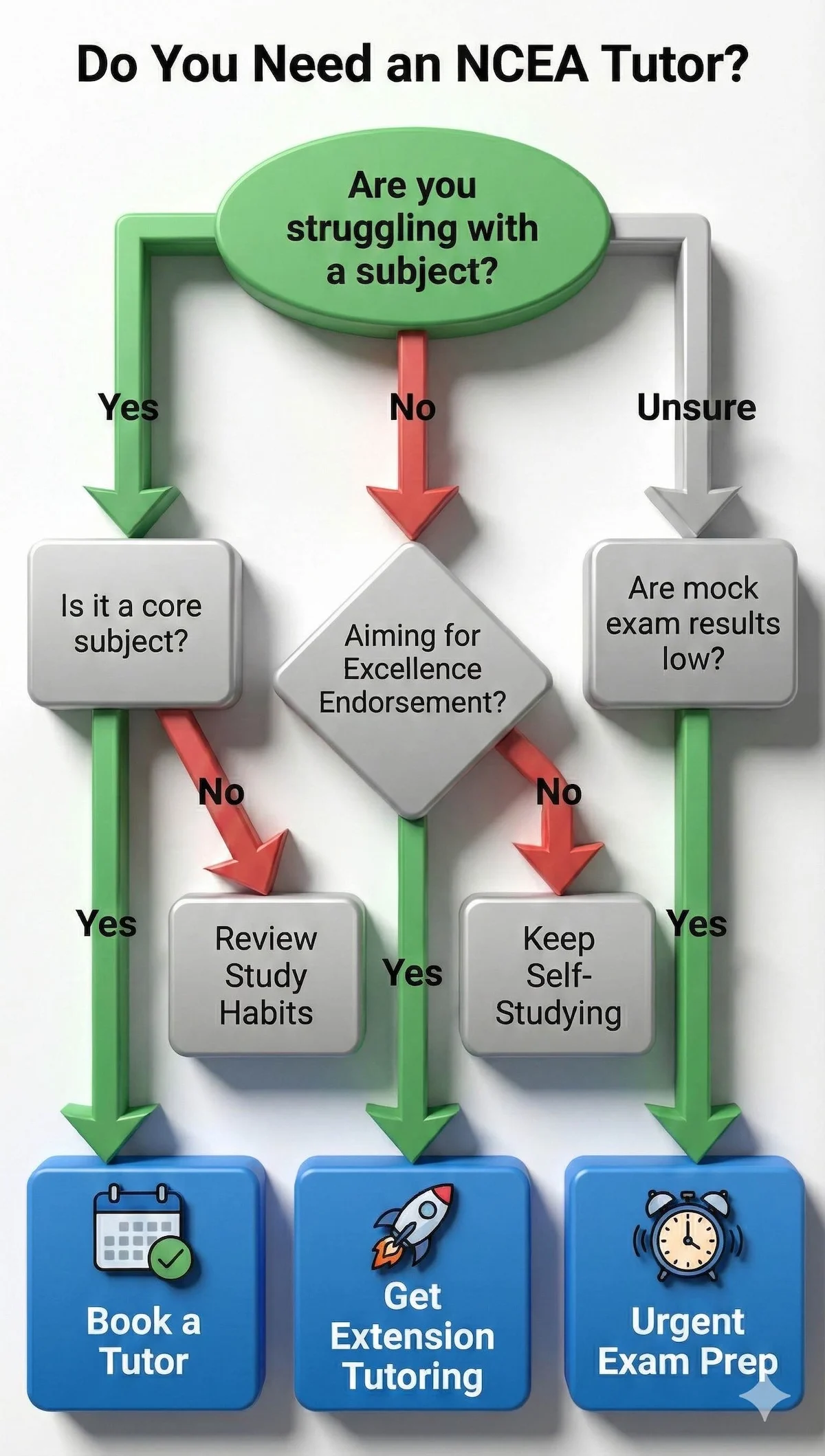
Follow this simple path to decide if extra support is the right move for your academic goals.
If you landed on ‘Book a Tutor’, getting help early is often more effective than waiting until just before exams.
Common Areas Where Students Seek Help
- NCEA homework help for writing analytical essays in NCEA English or Art History
- Concept-building in sciences like NCEA Chemistry and NCEA Physics
- Understanding statistical models in NCEA Mathematics and Statistics
- Planning design projects in NCEA Design and Visual Communication
- Revision for external exams in NCEA Geography or Biology
Benefits of NCEA Tutoring Online
Today’s learners value convenience. NCEA tutoring online gives students access to experienced tutors regardless of location. With tools like screen sharing, virtual whiteboards, and flexible scheduling, it’s easy to get help before a big internal or final exam, even from the Gulf or UK.
Platforms like My Engineering Buddy offer personalized guidance for over 40 NCEA subjects. Whether you need one-off NCEA assignment help or want to hire a NCEA tutor for weekly sessions, there are flexible, affordable options that won’t break your budget.
University Entrance (UE) and Career Pathways
To gain entry into a New Zealand university, students must earn:
- NCEA Level 3 certificate
- 14 credits in each of three approved subjects (e.g., NCEA Economics, NCEA Biology, NCEA English)
- Literacy (10 credits) and numeracy (10 credits) from Level 1 or higher
Gaining entrance to university requires a specific combination of credits. Use this formula to check if you are on track:
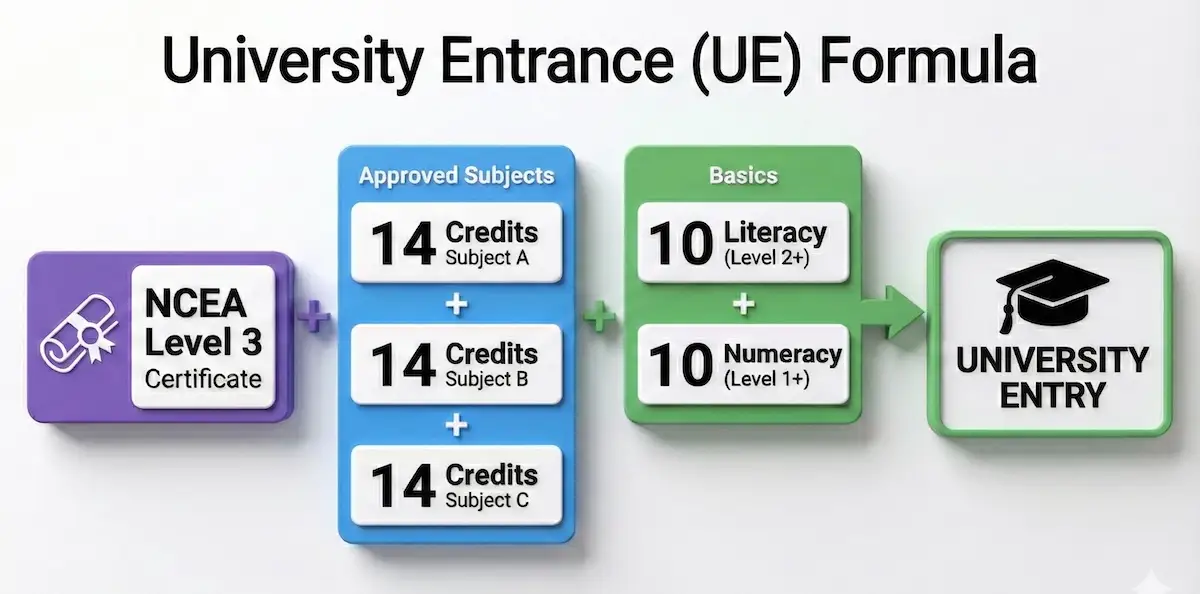
Memorize this formula: The specific credit combination required to enter any New Zealand university.
Missing even one of these components—like the 10 Literacy credits—can prevent university entry, regardless of how good your other grades are.
This makes subject selection crucial. For example, a student targeting medical school might combine NCEA Chemistry, Biology, and Physics, while a law aspirant might focus on NCEA English, Classical Studies, and Legal Studies.
Upcoming NCEA Reforms
New Zealand’s Ministry of Education plans to restructure NCEA over the coming years. Proposed reforms aim to simplify standards, introduce clearer achievement benchmarks, and shift from purely credit-based evaluation to more integrated, skills-focused learning. These changes may affect how subjects like NCEA Core Skills and NCEA Supported Learning are assessed and taught.
How to Choose the Right NCEA Tutor
When looking to hire a NCEA tutor, consider:
- Subject expertise: Make sure the tutor specializes in the NCEA subject needed—whether Digital Technologies or Pacific Studies.
- Teaching experience: Look for certified NCEA teachers or tutors familiar with NZQA guidelines.
- Past results: Reviews and testimonials help verify the tutor’s effectiveness in helping students gain Merit or Excellence.
- Flexibility: Online tutors offer sessions at times that suit different time zones and school workloads.
FAQs
Q1 What is NCEA?
NCEA is New Zealand’s official secondary school qualification system from Year 11 to Year 13.
Q2 How many subjects can I take in NCEA?
Most students take 5 to 6 subjects per year, selected from a wide curriculum.
Q3 Are internal and external assessments equally important?
Yes, both contribute to your credit total and affect your final NCEA results.
Q4 Can I get NCEA tutoring online?
Absolutely online NCEA tutors help with specific subjects, exam prep, and assignments.
Q5 How do I get university entrance through NCEA?
You need Level 3, 14 credits in 3 approved subjects, and required literacy/numeracy credits.
Q6 Is NCEA recognized overseas?
Yes, many international universities accept NCEA results for admission.
Related Subjects
NCEA Accounting
NCEA Adult Education
NCEA Agribusiness
NCEA Agricultural and Horticultural Science
NCEA Art History
NCEA Biology
NCEA Business and Management
NCEA Business Studies
NCEA Chemistry
NCEA Chemistry and Biology (Level 1 only)
NCEA Classical Studies
NCEA Commerce (Level 1 only)
NCEA Core Skills
NCEA Dance
NCEA Design and Visual Communication
NCEA Digital Technologies
NCEA Drama
NCEA Driver Licence (Class 1)
NCEA Early Childhood Education
NCEA Earth and Space Science
NCEA Economics
NCEA Education for Sustainability
NCEA English
NCEA English for Academic Purposes
NCEA English Language
NCEA Geography
NCEA Health
NCEA Health Studies (Level 1 only)
NCEA History
NCEA Home Economics
NCEA Legal Studies
NCEA Level 1 Geography
NCEA Levels 2-3 Accounting
NCEA Levels 2-3 Classical Studies
NCEA Literacy – Reading
NCEA Literacy – Writing
NCEA Maori
NCEA Materials and Processing Technology (Level 1 only)
NCEA Mathematics and Statistics
NCEA Media Studies
NCEA Music
NCEA Numeracy
NCEA Pacific Studies
NCEA Physical Education
NCEA Physics
NCEA Physics Earth and Space Science (Level 1 only)
NCEA Psychology
NCEA Religious Studies
NCEA Science
NCEA Social Studies
NCEA Sociology
NCEA Supported Learning
NCEA Technology
NCEA Visual Arts
******************************
This article provides general educational guidance only. It is NOT official exam policy, professional academic advice, or guaranteed results. Always verify information with your school, official exam boards (College Board, Cambridge, IB), or qualified professionals before making decisions. Read Full Policies & Disclaimer , Contact Us To Report An Error

